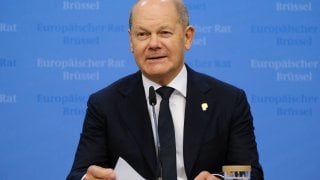Facing Donald Trump, Germany Should Engage With U.S. Conservatives
German analysts of American foreign policy debates are often blinded by what they want to see.
As Donald Trump prepares to return to the Oval Office, much attention in the German debate has been focused on his broader policy agenda, especially the possible centralization of power in the White House, migration policy, cabinet picks, and the future of Western support for Ukraine. While these issues are important, Germany cannot afford to overlook the potential shifts in U.S. nuclear strategy. This necessitates engagement with American conservative voices and Republican policymakers.
Under a second Trump presidency, the United States might decide to expand its nuclear forces and infrastructure, primarily to counter China’s nuclear buildup. Trump’s former National Security Advisor Robert C. O’Brien even advocated for resuming nuclear weapons tests, which would further challenge the test ban norm. The costs for U.S. nuclear forces were already estimated at approximately $750 billion until 2032 before the election—and could now increase further. A Republican majority in Congress could make it easier for Trump to pursue this path.
Nevertheless, Germany’s engagement with the United States continues to show gross deficits. The first problem is the tendency to paint U.S. presidents in extremes—either as messianic figures (like Kennedy and Obama) or as cartoon villains (like W. Bush and Trump). This dichotomous perspective is not indicative of a mature society but an adolescent one. Even under a Harris administration, a more robust U.S. nuclear weapons policy, including equipping missiles with additional nuclear warheads, would have been likely. However, if the Project 2025 playbook provides any indication, under a Republican administration, the scale of nuclear buildup could be considerably more extensive.
A second problem is the Germans’ selective perception of the United States. They often recognize only what they want to see or what can be viewed through a superimposed continental European perspective. When further filtered through a progressive lens, a double distortion of reality occurs. This makes it difficult to discern where the center of gravity lies in U.S. discourse. On nuclear arms control, for example, there is a bipartisan consensus to prepare for a three-way nuclear arms race with Russia and China.
A third problem related to this is that American discourses are often recounted almost verbatim in Germany. This is compounded by modes of reproducing American knowledge. However, German, European, and American interests and interpretations are not always congruent. A U.S. demand for investments in deterrence and toughness is not inherently more welcome than a U.S. demand for disarmament and dialogue—and vice versa. Germany must make its own assessment.
Above all, Berlin must broaden its engagement with the United States. Contacts with Republican politicians and conservative experts must be intensified, not only as a gesture of friendship but also as a necessity. This includes engaging with conservative foreign policy experts such as Elbridge Colby, Matt Costlow, Bob Peters, and Matthew Kroenig, to name a few. German officials and experts could work in tandem here, with some focusing on government officials and others on the broader expert community.
Germany will have to deal with Trump in an age of instability and a looming nuclear arms race. Russia’s war against Ukraine marks a generational shift, and for the foreseeable future, the United States will not revert to traditional strands of conservative or liberal internationalism.
This makes it even more necessary to engage with the Republican foreign policy and nuclear community to avoid unnecessary conflict and misunderstandings. The German side should be ready for that, as should U.S. conservatives. The guiding principle should be the following: a world of unconstrained arms racing would be very expensive for all sides involved. And in the end, there is no such thing as victory in a nuclear war.
Dr. Tobias Fella is a Senior Researcher at the Berlin office of the Institute for Peace Research and Security Policy at the University of Hamburg (IFSH).
Alexandros Michailidis / Shutterstock.com.

